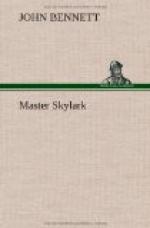The stranger seemed to like it, but scowled nevertheless. “What! How now?” he cried sharply. “Dost like or like me not?”
“Why, sir,” stammered Nick, utterly lost for anything to say—“why, sir,—” and knowing nothing else to do, he took off his cap and bowed.
“Come, come,” snapped the stranger, stamping his foot, “I am a swashing, ruffling, desperate Dick, and not to be made a common jest for Stratford dolts to giggle at What! These legs, that have put on the very gentleman in proud Verona’s streets, laid in Stratford’s common stocks, like a silly apprentice’s slouching heels? Nay, nay; some one should taste old Bless-his-heart here first!” and with that he clapped his hand upon the hilt of his poniard, with a wonderful swaggering tilt of his shoulders. “Dost take me, boy?”
“Why, sir,” hesitated Nick, no little awed by the stranger’s wild words and imperious way, “ye surely are the master-player.”
“There!” cried the stranger, whirling about, as if defying some one in the hedge. “Who said I could not act? Why, see, he took me at a touch! Say, boy,” he laughed, and turned to Nick, “thou art no fool. Why, boy, I say I love thee now for this, since what hath passed in Stratford. A murrain on the town! Dost hear me, boy?—a black murrain on the town!” And all at once he made such a fierce stride toward Nick, gritting his white teeth, and clapping his hand upon his poniard, that Nick drew back afraid of him.
[Illustration: “‘What! How now?’ Cried the stranger, sharply. ’Dost like or like me not?’”]
“But nay,” hissed the stranger, and spat with scorn, “a town like that is its own murrain—let it sicken on itself!”
He struck an attitude, and waved his hand as if he were talking quite as much to the trees and sky as he was to Nick Attwood, and looked about him as if waiting for applause. Then all at once he laughed,—a rollicking, merry laugh,—and threw off his furious manner as one does an old coat. “Well, boy,” said he, with a quiet smile, looking kindly at Nick, “thou art a right stanch little friend to all of us stage-players. And I thank thee for it in Will Shakspere’s name; for he is the sweetest fellow of us all.”
His voice was simple, frank, and free—so different from the mad tone in which he had just been ranting that Nick caught his breath with surprise.
“Nay, lad, look not so dashed,” said the master-player, merrily; “that was only old Jem Burbage’s mighty tragic style; and I—I am only Gaston Carew, hail-fellow-well-met with all true hearts. Be known to me, lad; what is thy name? I like thy open, pretty face.”
Nick flushed. “Nicholas Attwood is my name, sir.”




